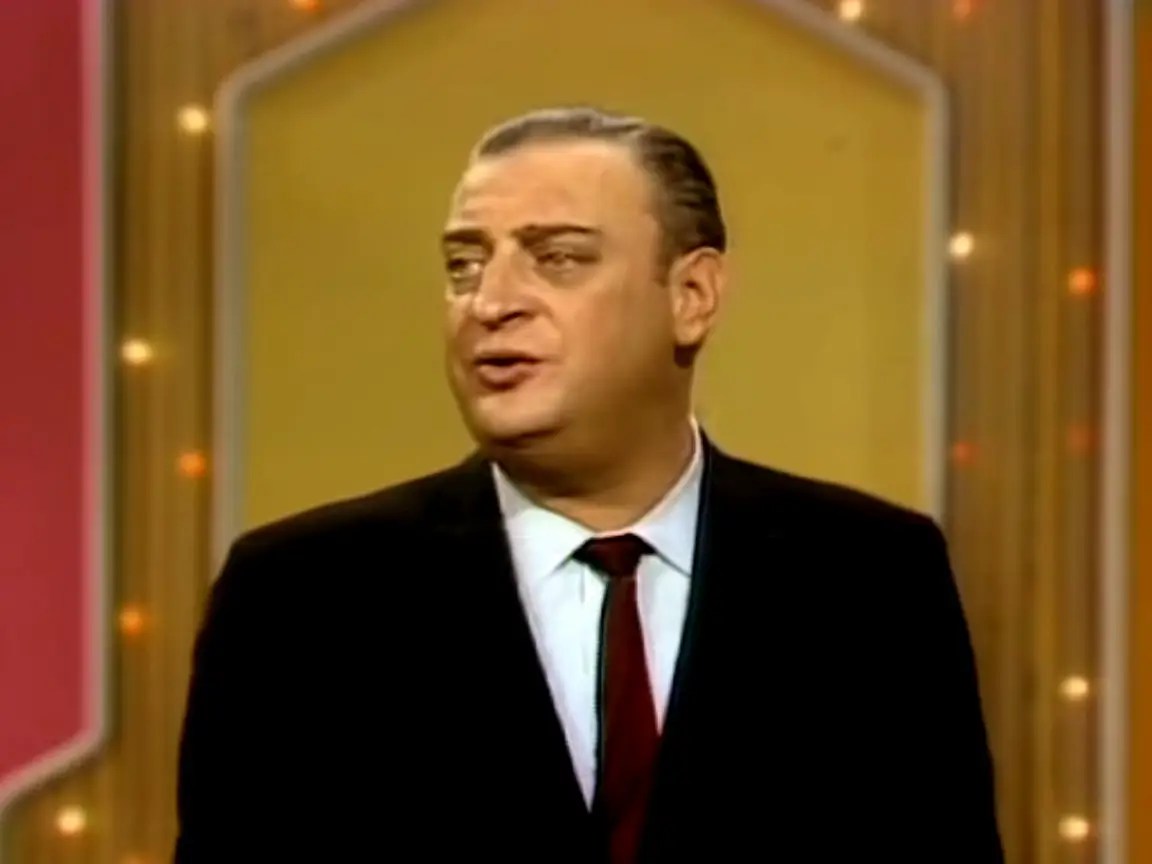“I tell ya, I get no respect.” Rodney Dangerfield’s signature line was comedy gold, a relatable lament that resonated with audiences for decades. But while he might have joked about getting “no respect,” his bank account told a different story. At the time of his death in 2004, Dangerfield’s net worth was estimated at a hefty $20 million, which would be roughly $30 million today. Looks like someone was laughing all the way to the bank!
The Making of a Self-Deprecating Mogul
How did a guy who built his career on being a loveable loser amass such a fortune?
1. Stand-Up: From Flop Sweat to Big Bucks
Dangerfield’s journey to comedic success wasn’t always pretty. He toiled for years, honing his act, bombing on stage (sometimes literally, if the tomatoes were flying), before finally finding his groove in the late ’60s. His self-deprecating humor, peppered with those iconic one-liners, struck a chord with audiences. He became a regular on “The Ed Sullivan Show,” appeared on “The Tonight Show” over 70 times, and released a string of successful comedy albums. All those late nights and punchlines added up to some serious cash.
2. Lights, Camera, Dangerfield!
Stand-up was just the beginning for this comedic force of nature. Dangerfield took his “no respect” shtick to Hollywood, starring in a string of hit comedies like “Caddyshack,” “Back to School,” and “Easy Money.” These films weren’t just box-office successes; they solidified his place as a comedic icon and, of course, fattened his wallet.
3. The Business of Funny
Dangerfield wasn’t just a funny guy; he was a shrewd businessman. He understood the power of owning a stage, so he opened Dangerfield’s Comedy Club in New York City. This wasn’t just a vanity project; it became a legendary proving ground for up-and-coming comedians and a lucrative venture for its owner.
Life After “No Respect”: A Lasting Legacy
Even though Dangerfield left us in 2004, his comedic legacy continues to earn him respect (and probably a chuckle or two) from beyond the grave. His stand-up specials and movies remain popular, introducing new generations to the “no respect” king. His comedy club, still going strong, stands as a testament to his enduring impact on the world of comedy.
And then there’s the money. Dangerfield’s estate, managed by his widow Joan Dangerfield, continues to generate income through merchandise, licensing agreements, and digital streaming of his work. “There goes the neighborhood,” reads his tombstone at the Pierce Brothers Westwood Village Memorial Park in Los Angeles. It seems even in death, Dangerfield couldn’t resist getting in one last laugh.
Beyond the Punchlines: A More Complete Picture
While Dangerfield’s success story is undeniable, comparing his net worth to contemporaries like George Carlin or Richard Pryor reveals some interesting insights. Were there factors beyond comedic talent at play? Did Dangerfield’s business ventures, like his comedy club, significantly out-earn those of his peers? These questions offer a glimpse into the business side of comedy and the varying paths to financial success in the entertainment industry.
Dangerfield’s “no respect” persona wasn’t just a comedic choice; it was a brilliant branding strategy. The catchphrase resonated so deeply that it transcended stand-up routines, becoming synonymous with the comedian himself. This strong brand identity undoubtedly contributed to the success of his merchandise, licensing deals, and overall earning potential.
Perhaps the most intriguing aspect of Dangerfield’s legacy is the enduring influence of his self-deprecating humor. Modern comedians, from Larry David to Amy Schumer, continue to mine the comedic potential of awkwardness and insecurity. It begs the question: Does this style of humor, born from vulnerability, resonate more deeply with audiences, leading to greater success in today’s comedy landscape? While there’s no simple answer, exploring the connection between comedic style and financial success offers a fascinating glimpse into the evolving world of humor.
Important Note: For the Joan Dangerfield quote, it’s essential to refer to the original source article (“Widow reflects on life of ‘Easy Money’ comedian Rodney Dangerfield”). The quote provided feels incomplete and lacks context.
If you’re interested in exploring the financial journeys of other entertainment icons, be sure to check out our articles on Roger Daltrey’s net worth and Rumer Willis’ net worth. You might be surprised at what you discover!










